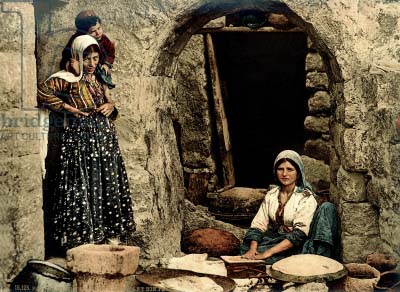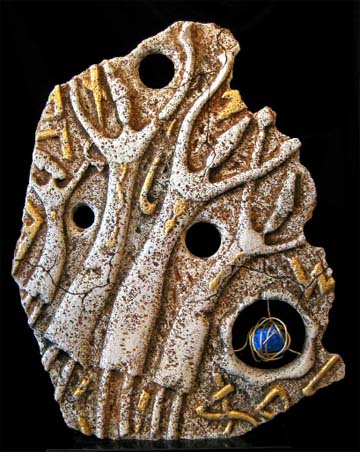Category Archives: Lebanon
Lebanese Hymns of Love and War- Part 2
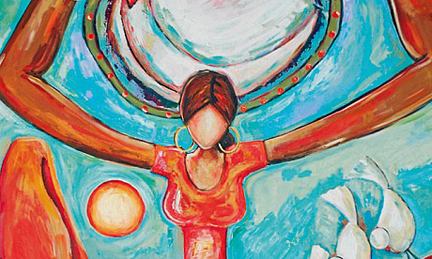
Artwork by Lebanese artist Fady Habib
By George N. El-Hage. Ph.D.
[Originally written in Arabic and Translated by Allen Lederman and George Nicolas El-Hage. For part 1, click here.]
1 – Glory be to Lebanon and the strength and dignity of man in her, now and forever.
2 – Oh my Lebanese friend, if only you could witness the politicians, and by God they are many. Those who deprived politics of its national obligations, you will see them as they are, without their chameleon skins, parrot tongues, and raven cloaks. If only you saw them in the mirror of truth and patriotism, you would curse them and refuse their sedition.
3 – Because Lebanon embodies love, and love embodies God, Lebanon endures. Fear not, oh Lebanese.
4 – No. The sound of the cannons and the explosions of the bombs and bullets no longer frighten our women. For the Woman who reared history’s greatest heroes is able to beget heroism any time.
5 – Those who died in the cause of Lebanon know they live in our hearts and that to die for Lebanon, is to live.
6 – Never have invaders and oppressors been more powerful than a people fighting for its survival. Thus we know we will triumph and endure.
7 – Those who sold their homeland and bartered their cause do not even deserve the curse of history, for he who has neither country nor cause, is non-existent.
8 – Those whom Lebanon harbored and fed, and carried their cause to the world, chased her people out, starved and killed them. We will continue to love them, for what good is it to love only those who love you. Continue reading Lebanese Hymns of Love and War- Part 2
Tabsir Redux: The Cynical Dairy Farmer’s Guide to the New Middle East

BY Karim Sadjapour, Foreign Policy, June 15, 2011
How a couple of cows explain a changing region: equal opportunity offender edition.
In the early years of the Cold War, in an effort to simplify — and parody — various political ideologies and philosophies, irreverent wits, in the spirit of George Orwell, went back to the farm. No one really knows how the two-cow joke known as “Parable of the Isms” came about, but most students of Political Science 101 have likely come across some variation of the following definitions:
Socialism: You have two cows. The government takes one of them and gives it to your neighbor.
Communism: You have two cows. The government takes them both and provides you with milk.
Nazism: You have two cows. The government shoots you and takes the cows.
Capitalism: You have two cows. You sell one and buy a bull.
Over the years, the parables gradually expanded, using the two-cow joke to explain everything from French unions (You have two cows. You go on strike because you want three cows.) to the Republican Party (You have two cows. Your neighbor has none. So what?). While in its original iteration the cows were a metaphor for currency, capital, and property, they later began to take on different meanings.
Today, the Middle East has replaced the Cold War as America’s primary foreign-policy preoccupation. As opposed to the seemingly ideologically homogenous communist bloc, however, the 22 diverse countries that compose the modern Middle East are still confusing to most Americans. Why can’t the Israeli and Palestinians stop fighting already? What’s the difference between Libya and Lebanon again?
Herewith then is a satirical effort to simplify the essence of Middle Eastern governments so that, in the immortal words of George W. Bush, “the boys in Lubbock” can read it. And, rather than symbolizing property, the cows here symbolize people, which — funny enough — is how most Middle Eastern regimes have traditionally viewed their populations.
Saudi Arabia
You have two cows with endless reserves of milk. Gorge them with grass, prevent them from interacting with bulls, and import South Asians to milk them.
Iran
You have two cows. You interrogate them until they concede they are Zionist agents. You send their milk to southern Lebanon and Gaza, or render it into highly enriched cream. International sanctions prevent your milk from being bought on the open market.
Syria
You have five cows, one of whom is an Alawite. Feed the Alawite cow well; beat the non-Alawite cows. Use the milk to finance your wife’s shopping sprees in London.
Lebanon
You have two cows. Syria claims ownership over them. You take them abroad and start successful cattle farms in Africa, Australia, and Latin America. You send the proceeds back home so your relatives can afford cosmetic surgery and Mercedes-Benzes.
Hezbollah
You have no cows. During breaks from milking on the teat of the Iranian cow you call for Israel’s annihilation. Continue reading Tabsir Redux: The Cynical Dairy Farmer’s Guide to the New Middle East
Petition for a Kahlil Gibran US Postage Stamp
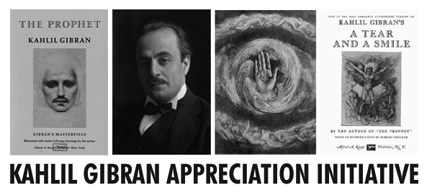
Sign the Petition for a Kahlil Gibran US Postage Stamp!
Why Gibran?
Since his passing, fans of Gibran Kahlil Gibran (1883-1931) have called for a fitting tribute to the poet, author, artist, and philosopher, who remains one of the most renowned figures in the world literary landscape. For Arab Americans and Arabs daunted by political, financial and social uncertainty, Gibran holds a valuable place as the immigrant voice in America. Arab Americans and Arabs have long ago claimed Gibran’s achievements as their own, proudly holding his life and works close to their hearts.
Perhaps this protective emotional engulfing has to do partly with Gibran’s own quest to belong. Early on in his childhood, the Lebanese born poet was rendered homeless after his father was sent to prison for tax evasion, and his property was impounded. Shortly thereafter, the family emigrated to Boston’s South End, where non-English speaking Gibran was told he should Anglicize his name, and refer to himself simply as Kahlil Gibran. Continue reading Petition for a Kahlil Gibran US Postage Stamp
George Nicolas El-Hage: If you were mine, 2
[This is the second in a series of poems translated from the Arabic of George Nicolas El-Hage’s If You Were Mine. For the first installment, and information about the poet, click here.]
Exile
My unbelief and sins and faith
And black cares watch over me
September and March come
And I am in my room, collapsing
A nightmare wears my sorrows …
It comes to me also, comes to me
News, my dark one, threw me
Into your eyes’ hollow it threw me …
Other years I wait
December and January …
The room swells in my breast
I die slowly …
The room swells in my breast
I live through seasons, unaware,
That exile is my country.
Continue reading George Nicolas El-Hage: If you were mine, 2
George Nicolas El-Hage: If you were mine, 1
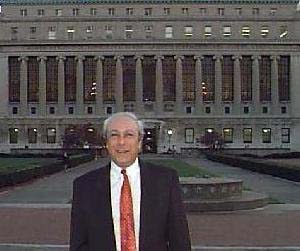
Poems by George Nicolas El-Hage
Translated from the original Arabic by Diana Malouf and George El-Hage
Introduction by Khalil Semaan, Binghamton University.
George Nicolas El-Hage was born in Mansourieh, near Beirut, Lebanon. He was educated at the Lebanese University of Beirut and in the United States where he earned an M.A and a Ph.D. in Arabic and Comparative Literature at Binghamton University in N.Y. His Dissertation (later published into a book by NDU Press, Lebanon) was on William Blake and Kahlil Gibran: Poets of Prophetic Vision. He has taught at Yale University, Binghamton University, The Lebanese University, Columbia University, Monterey Institute of International Studies and the Defense Language Institute. His academic career was equally spent between teaching, authoring, lecturing and administration.
He published five volumes of poetry, numerous research articles, books on language pedagogy and poetry in Lebanese Dialect and Zajal. While in Beirut, El-Hage studied with and was influenced by poets like Buland al-Haidari and Khalil Hawi. His poetry betrays a marked fluctuation between a deep romantic sensitivity and a tragic existential awareness which colors his reading of current universal and regional events. The tragedy of his embattled country constitutes a dominant theme in his writings. El-Hage is a supporter of the free verse movement in Modern Arabic Poetry. Nevertheless, he still appreciates the Qasida ‘Amudiyya, the classical form of traditional Arabic Poetry. He always chooses short meters and his poetry is characterized by its musical effects.
From El-Hage’s book of poetry: If You Were Mine
From the INTRODUCTION
No, I shall not tell you that I became a poet. The day I read joy and sadness in your smile and witnessed the sun rising in your eyes, I abandoned my heart, crucified on the ivory ramparts of your face, and setting sail, I strove to navigate the deep waters of inspiration. That day, I discovered my inner self in the mirror of your pure love, and I vowed to tell you this in words. These are some of them. Continue reading George Nicolas El-Hage: If you were mine, 1
New Syrian Schools in Lebanon

New Syrian Schools in Lebanon: between refugees’ empowerment and unwillingly fueled Social Alienation
by Estella Carpi
Last October 1, the school “Madrasat al-Iman al-Islamiyya†in Abu Samra in the city of Tripoli (North Lebanon) opened to “fresh off the boat†Syrian refugee kids and youth, in order to cope with the need of providing proper education in their everyday existential limbo.
The doors of this originally Lebanese Islamic school open daily to Syrian pupils from 4pm to 6pm in the afternoon, with the exception of Friday and Sunday, as established in the Tripoli district school calendar. When I visited the school on a Friday morning, the space was being used for playing volleyball and other entertainment activities were organized in class. The Back-to-School campaign has been quite large this year in Lebanon. To date, 4,942 children have been enrolled in schools, 1,650 of who are also supported by UNICEF, of a total refugee population of 162,050 individuals according to the most updated statistics provided by UNHCR.
“Soon we’re going to open new classes for high school students as wellâ€, tells me A., administrative staff member of the school. The school director specifies that there will not be any coordination between the Syrian and the Lebanese school programme: “We made certain that, once the kids are done with their studies here and they will be able to get back to Syria in safe conditions, their certificate will be considered valid whatever the political system will be back home, with or without nizam al-Assad†(the current Syrian regime of Bashar al Assad). The school policies, hence, purvey the underlying intention of the whole Syrian refugeehood system to get back to Syria as soon as it is feasible. “We are going to translate all books from French and English – used in the Lebanese school system – into Arabic, and it’s going to be a big jobâ€, explains to me the director of the school, who has been in Lebanon for 31 years, unlike the newly arrived Syrian teachers and the school’s administrative staff, who make up the vast majority. Continue reading New Syrian Schools in Lebanon
Being Normal and being Car Bombed
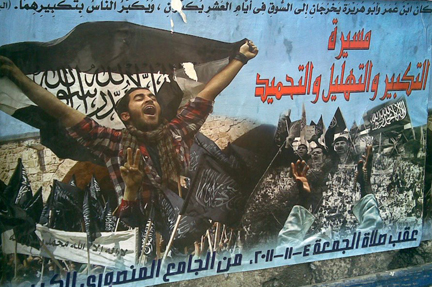
Poster in Tripoli, Lebanon; photography by Estella Carpi
Unearthing a misconceived “normalization†of violence in Beirut. The October car bomb in relation to generalized insecurity.
The 19th October 2012 car bomb in Beirut’s Ashrafiyye, within the Eastern district of the Lebanese capital, shed light on the re-articulation of the relations between the State, allegedly “inexistent†in the Lebanese context, and its society that lives in the constant effort to subjectively reformulate their citizenship, in the lack of a commonly shared nationhood.
New outbursts of violence seem to give a reason to the state to promote its technology of control, as Michel Foucault would put it. This complex re-articulation of relations has come to the fore with the October 26 White March from Martyrs Square (Beirut Downtown) to Sassine Square (Ashrafiyye, where the explosion was one week before). The “White Marchâ€, in which no political flag but the national Lebanese was waved, wanted to be considered as an act of social refusal of further violence and national solidarity, in addition to their political contestation of both the 14 and 8 March coalitions, which have politically and socially polarized the country into two sections after Hariri’s murder in February 2005. The White March mainly had the implicit aim of contesting the taken for granted watershed between what is “normal†and what is not in Lebanese parameters.
Social fear, as well as the perception of risk in Beirut, has specific historical explanations. Lebanese society seems to be doomed to live in a not-war-not-peace state, as Jeffrey Sluka used to define Northern Ireland during the clashes between Protestants and Catholics. Such an unstable state has engendered a social attitude towards violence that has been named by political scientists and journalists as “normalizationâ€, which, in light of the Lebanese reaction to the last explosion, begs for a re-conceptualization. Continue reading Being Normal and being Car Bombed
